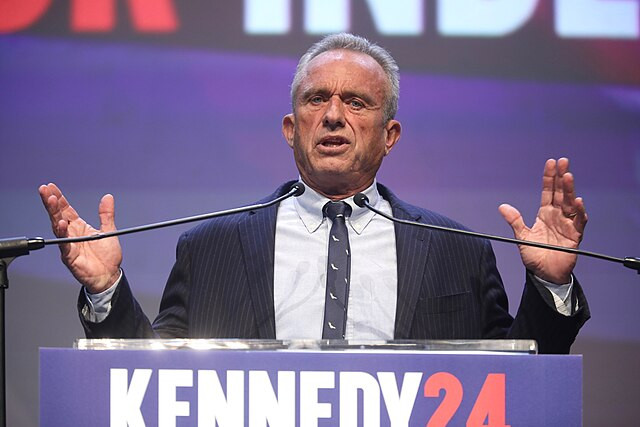Robert F. Kennedy Jr.'s presidential campaign, often characterized as a vanity project, took a new turn on Tuesday with the announcement of his running mate, Nicole Shanahan. The Silicon Valley tech entrepreneur and philanthropist, who shares Kennedy's controversial views on vaccines and medicine, brings not only ideological alignment but also deep pockets to the campaign.
During the political coming-out party in Oakland, California, Shanahan suggested that one of the causes of her own daughter's autism was vaccines and medicine typically given to children. This stance aligns with the contested views Kennedy has espoused for years, drawing criticism from the medical community and his own family members.
Shanahan's financial backing has already played a significant role in Kennedy's campaign. She donated about $4 million to Kennedy and helped fund more than half of a $7 million commercial that aired during the Super Bowl. As running mates, Kennedy and Shanahan appear to be a perfect match, with her sharing his unconventional views and providing the financial resources to keep his campaign afloat.
Get to know my running mate, Nicole Shanahan:https://t.co/8deogGhnXP pic.twitter.com/fZM3HZKexQ — Robert F. Kennedy Jr (@RobertKennedyJr) March 26, 2024
However, political experts argue that while the pair may have no chance of winning the election, they have every chance of tilting the November election, likely in favor of former President Donald Trump. Kennedy's campaign has been polling at around 10%, according to an average of polls compiled by The Hill, prompting accusations that he is acting as a spoiler in the race.
During the lengthy announcement event, Kennedy and his warm-up speakers complained about the media's coverage of his campaign, arguing that he is not being taken seriously as a contender. The Democratic National Committee hosted a media call moments after Shanahan's speech, with U.S. Rep. Robert Garcia, a California Democrat, labeling Kennedy as a "tinfoil hat conspiracy theorist" and accusing Shanahan of doubling down on "anti-vaccine conspiracies and anti-health agenda."
Shanahan, a political novice and former Biden donor, expressed her disillusionment with the Democratic Party, stating that "as an institution, it has lost its way." She attributed her initial lack of knowledge about Kennedy to the "mainstream media narrative" that was "effectively telling me horrible, disparaging things" about him. However, after listening to an interview where Kennedy spoke his mind, Shanahan became convinced that the negative portrayal of him amounted to "media slander of his character."
Before becoming one of Kennedy's most prominent donors, Shanahan was best known as the wife of Google co-founder and tech billionaire Sergey Brin. Their high-profile divorce in 2021 made headlines after reports of an alleged affair between Shanahan and Elon Musk surfaced, which both parties denied.
Shanahan's philanthropic interests and donations align with the wealthy world of Silicon Valley that has embraced Kennedy. She is the president of a non-profit that funds research into reproductive longevity, a field of growing fascination within the tech world, and has pledged millions to support its work.
As the campaign progresses, Kennedy and Shanahan face an uphill battle, with the Democratic Party mobilizing to marginalize their efforts and fight their ballot access state by state. The partnership between the two, built on shared controversial views and financial backing, highlights the unconventional nature of Kennedy's presidential bid and raises questions about its potential impact on the upcoming election.
While Kennedy and Shanahan may view their campaign as a challenge to the political establishment, critics argue that their efforts are more likely to serve as a distraction and potentially benefit Trump's re-election bid.






